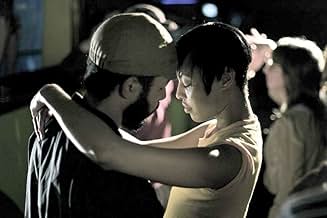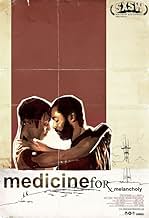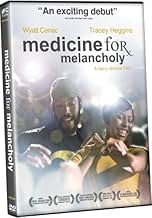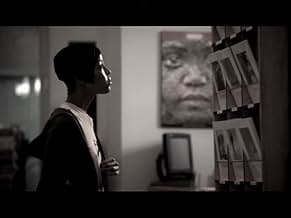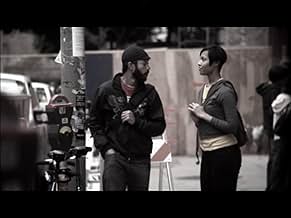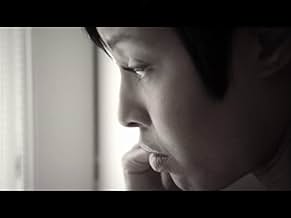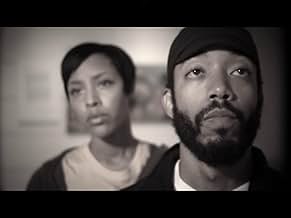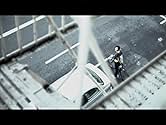AVALIAÇÃO DA IMDb
6,6/10
2,9 mil
SUA AVALIAÇÃO
Adicionar um enredo no seu idiomaTwenty-four hours in the tentative relationship of two young San Franciscans also dealing with the conundrum of being a minority in a rapidly gentrifying city.Twenty-four hours in the tentative relationship of two young San Franciscans also dealing with the conundrum of being a minority in a rapidly gentrifying city.Twenty-four hours in the tentative relationship of two young San Franciscans also dealing with the conundrum of being a minority in a rapidly gentrifying city.
- Prêmios
- 2 vitórias e 10 indicações no total
Melissa Bisagni
- Sierra Orneilias
- (as Melisa Bisagni)
Chida Emeka
- Hydration Hustler 1
- (as Chidi Emeka)
Ondine Kilker
- Ondine Kilcher - Housing Rights Meeting Attendee
- (as Ondine Kilcher)
Avaliações em destaque
The premise of a man and woman rushing through all the phases of falling in love in one twenty-four hour period with the backdrop of a great city is a popular one. Nonetheless, it is a formula I never tire of, especially given the three main characters of "Medicine for Melancholy": Micah, Jo and the city of San Francisco. An awkward introduction in the light of day after a drunken one-night stand leads to an inauspicious "date" spent biking and cabbing around San Francisco. Unlike the relentless (but entertaining) dialogue of the Ethan Hawke and Julie Delpy characters in "Before Sunrise," or the charming tension between the mis-matched and ill-fated Audrey Hepburn and Gregory Peck in "Roman Holiday," the couple in "MFM" spend long moments of non-verbal connecting that is tinged by an overt sadness. This melancholy is confirmed by the sad dog eyes of Micah, the initially cold reaction of Jo and the lovely washed out hues of James Laxton's cinematography as he records the events of the single day shared by the couple. This movie is not driven by a narrative per se but by a series of moments that show a real emotional ballast many cinematic long-term relationships could not convey. Yet, the inevitability of the day's end and thus of the relationship's (mirrored by the fate of the city itself as it succumbs to a gentrified, character-less version of its fabled self), create a longing I felt hours after the movie ended. The soundtrack certainly contributed.
Twenty-four hours in the tentative relationship of two young San Franciscans also dealing with the conundrum of being a minority in a rapidly gentrifying city.
Barry Jenkins has described the film's two main characters as "playing out a debate back and forth about identity politics". Each of the two main characters embodies an ideology. Jenkins saw the character of Micah as a man who was always building barriers, whereas Jo thinks that race is a limiter. Accusing Jo of assimilation, Micah strives to reclaim his essential "blackness" as Jo contrastingly claims Micah has a "hang up" about his race and strives to overcome her own.
Roger Ebert gave the film 3.5 out of 4 stars, calling the actors "effortlessly engaging" and the direction "assured"; he also noted the film was "beautifully photographed". Ebert is right on all counts. The acting is superb, very natural, and really shows off Wyatt Cenac as more than a comedian. The direction is strong, and the cinematography is gorgeous, some of the best you will find anywhere, whether in a big budget film or indie.
The discussion of race is great. As a white man, maybe I can't see the issue from the point of view of Micah, Jo or Barry Jenkins. But I love that there's this divide of ideas. Micah is indignant, as he should be, about being a minority. But Jo prefers to look forward. Indeed, how does one define themselves? I don't think of myself as "white", and sometimes not even as a "man", but do these things define me whether or not I choose to accept them?
Barry Jenkins has described the film's two main characters as "playing out a debate back and forth about identity politics". Each of the two main characters embodies an ideology. Jenkins saw the character of Micah as a man who was always building barriers, whereas Jo thinks that race is a limiter. Accusing Jo of assimilation, Micah strives to reclaim his essential "blackness" as Jo contrastingly claims Micah has a "hang up" about his race and strives to overcome her own.
Roger Ebert gave the film 3.5 out of 4 stars, calling the actors "effortlessly engaging" and the direction "assured"; he also noted the film was "beautifully photographed". Ebert is right on all counts. The acting is superb, very natural, and really shows off Wyatt Cenac as more than a comedian. The direction is strong, and the cinematography is gorgeous, some of the best you will find anywhere, whether in a big budget film or indie.
The discussion of race is great. As a white man, maybe I can't see the issue from the point of view of Micah, Jo or Barry Jenkins. But I love that there's this divide of ideas. Micah is indignant, as he should be, about being a minority. But Jo prefers to look forward. Indeed, how does one define themselves? I don't think of myself as "white", and sometimes not even as a "man", but do these things define me whether or not I choose to accept them?
You couldn't make a movie that looks more like my day to day life in San Francisco than this. Telling the story of two black twenty-somethings who meet and have a one night stand, they start off the morning after in Bernal Heights, walk over to Noe Valley for breakfast, hop a cab to the Marina to drop her off, then he heads back to his studio on Geary at Hyde, two blocks from where I once rented a nearly identical apartment, down to the rotating walk-in closet door that once sported a Murphy bed. The couple meet again and head to the Museum of the African Diaspora on Mission and then over to Yerba Buena Gardens to ride the merry-go-round, both a block away from where I work. Later that night they buy stuff for dinner at Rainbow Grocery then head down to the Knockout to dance while my pal DJ Paul Paul spins 45s although his oldies singles are overdubbed on the film's soundtrack with obscure but cool indie rock. But aside from the pleasure of seeing all my usual haunts captured on on film, or digital video rather, Medicine For Melancholy is a smart movie that captures not only the vibe of life in downtown San Francisco, but also the subtleties of the changing ethnic and economic demographics of the second most expensive city in the country. The guy—played by Wyatt Cenac, an occasional correspondent on John Stewart's Daily Show—has a deadpan quarrelsomeness that is occasionally hilarious, because not only is he concerned about the ongoing disenfranchisement of the black community in the city, he's also bugged about the pending disenfranchisement of himself from the girl's pants once her live-in boyfriend returns to town. Her boyfriend, by the way, is white, which Cenac's character tries to elevate to a political issue because of his looming romantic frustration, but she's not having it, which leads to one of the film's best exchanges as they argue about the role race plays in forming their sense of self-identity. Lots of clever relationship stuff, like surreptitiously scoping out each other's MySpace profiles and sharp naturalistic dialogue as they continually negotiate and renegotiate the emotional boundaries and ending point of their one day affair. And maybe the scene with the housing activists meeting was a digression, but you know what, if you live here that stuff is very important and on everybody's mind, and it fits nicely given the context of the film whether you like it or not. Highly recommended.
Barry Jenkins' (Moonlight/If Beale Street Could Talk) first film from 2008. After a nightly hookup, two lovers, Wyatt Cenac & Tracey Heggins, wake the next morning & share some awkward air together which results in some small talk, toothbrushing w/fingers & a shared breakfast & a ride home. Heggins forgets her purse in the taxi causing Cenac to take his bike towards where she got off & going from house to house he finds her where they make some more small talk & then finally decide to spend the day together while bike riding & visiting the sights of the city. Jenkins gets to the heart of those relationships which start in such a cringe manner but the pointed conversations & silences soon win the audience over to stick around to see how this union will play out w/nice low key perfs from the leads & the city of San Francisco itself which gets it due as the perfect backdrop for this love affair in utero.
Micah and Jo' wake up next to one another after an one-night-stand at a drunken party. Slipping away they awkwardly go their separate ways, but Micah sees her later to return her wallet. They spend the remainder of that day together, biking and walking around San Francisco and chatting generally as they go. This is about the size of the plot and those looking for more of a definite narrative should probably be warned that this is very much a niche indie film that will appeal chiefly to those that like the film almost before they have seen it. I'm not sure if I fall into that category as an older casual viewer but then I did make a certain amount of effort to get hold of the film so I suppose I did have a vested interest to like it. And mostly I did like it: mostly.
The low-key indie feel of the whole film will feel pretentious to some I'm sure but for me it had a certain lo-fi charm that came from the project as a whole. Although the path of the two characters didn't really strike me as realistic or convincing, the charm with which it was delivered helped me to put this out of my mind for the most part. This allowed me to hang out with them as they bumble around the city together in a way that will be recognisable to anyone who has done the same in any major city. In this regard I really liked the film and I enjoyed the "coolness" of it and I didn't care too much that "nothing was happening" in a traditional sense.
This makes for a very slight film and it needed to have a conclusion that fits that – which it sort of does, the problem is more what it includes in the final third. We suddenly have discussions over race that feel clunky compared to the majority of the scenes that had gone before; this made it a little grating and didn't fit with the rest of the film. Of course this does fit well when compared to the sudden introducing of a meeting of random people discussing gentrification in San Francisco, this doesn't fit at all and indeed this sudden introduction of social commentary just clunks onto the screen without any real context or relevance, giving the impression that the film wants to have this aspect but wasn't able or willing to make it part of the whole film, but rather just one scene.
The charm of it is key though and the casting was very important in making this work. Finding Wyatt Cenac in the lead was a surprise and perhaps a bit of a worry since I generally find him to be the least able of those on the Daily Show; I like him but his performances on that show are never as good as John Olivier, Larry Wilmore or some of the stronger ones. Here though he is awkwardly charming in a weird geeky way. He does walk a fine line because at times he could have been irritating but he keeps it on the right side of the line. He is helped a lot by his chemistry with Heggins. She is wonderfully awkward and cute; OK she never got her character's motivations through to me but I still really took to her and to both of them together.
Medicine for Melancholy is a very slight film though and it is not something to come to with high expectations. Rather the indie design and delivery is something that charms those that left it, thanks to the work by maker Jenkins and also the chemistry of the lead two. The attempts to have some form of commentary or meaning in it really clunk towards the end but ultimately, while not great, it is a lo-fi indie pleasure.
The low-key indie feel of the whole film will feel pretentious to some I'm sure but for me it had a certain lo-fi charm that came from the project as a whole. Although the path of the two characters didn't really strike me as realistic or convincing, the charm with which it was delivered helped me to put this out of my mind for the most part. This allowed me to hang out with them as they bumble around the city together in a way that will be recognisable to anyone who has done the same in any major city. In this regard I really liked the film and I enjoyed the "coolness" of it and I didn't care too much that "nothing was happening" in a traditional sense.
This makes for a very slight film and it needed to have a conclusion that fits that – which it sort of does, the problem is more what it includes in the final third. We suddenly have discussions over race that feel clunky compared to the majority of the scenes that had gone before; this made it a little grating and didn't fit with the rest of the film. Of course this does fit well when compared to the sudden introducing of a meeting of random people discussing gentrification in San Francisco, this doesn't fit at all and indeed this sudden introduction of social commentary just clunks onto the screen without any real context or relevance, giving the impression that the film wants to have this aspect but wasn't able or willing to make it part of the whole film, but rather just one scene.
The charm of it is key though and the casting was very important in making this work. Finding Wyatt Cenac in the lead was a surprise and perhaps a bit of a worry since I generally find him to be the least able of those on the Daily Show; I like him but his performances on that show are never as good as John Olivier, Larry Wilmore or some of the stronger ones. Here though he is awkwardly charming in a weird geeky way. He does walk a fine line because at times he could have been irritating but he keeps it on the right side of the line. He is helped a lot by his chemistry with Heggins. She is wonderfully awkward and cute; OK she never got her character's motivations through to me but I still really took to her and to both of them together.
Medicine for Melancholy is a very slight film though and it is not something to come to with high expectations. Rather the indie design and delivery is something that charms those that left it, thanks to the work by maker Jenkins and also the chemistry of the lead two. The attempts to have some form of commentary or meaning in it really clunk towards the end but ultimately, while not great, it is a lo-fi indie pleasure.
Você sabia?
- CuriosidadesMade on a budget of $13,000.
- Cenas durante ou pós-créditosEach song in the soundtrack appears in the credits with a still frame from the part of the movie where it was used.
Principais escolhas
Faça login para avaliar e ver a lista de recomendações personalizadas
- How long is Medicine for Melancholy?Fornecido pela Alexa
Detalhes
- Data de lançamento
- País de origem
- Central de atendimento oficial
- Idioma
- Também conhecido como
- Remedio para melancólicos
- Locações de filme
- Empresas de produção
- Consulte mais créditos da empresa na IMDbPro
Bilheteria
- Orçamento
- US$ 13.000 (estimativa)
- Faturamento bruto nos EUA e Canadá
- US$ 111.551
- Fim de semana de estreia nos EUA e Canadá
- US$ 12.625
- 1 de fev. de 2009
- Faturamento bruto mundial
- US$ 111.551
- Tempo de duração
- 1 h 28 min(88 min)
- Cor
- Proporção
- 1.78 : 1
Contribua para esta página
Sugerir uma alteração ou adicionar conteúdo ausente





